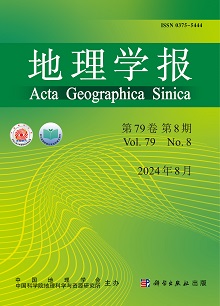Evaluation of water-land resources in karst regions within the framework of sustainable development goals
Zhang, Hao , Zhou, Qingping , Yang, Jianzan , Xiang, Huawei
2025-03-07 null null 13(卷), null(期), (null页)
Introduction The shortage and irrational utilization of water-land resources (WLR) are the main obstacles to the sustainable development of karst regions.Methods In accordance with the principles of Sustainable Development Goals (SDGs), an evaluation system for WLR utilization was established. As a representative karst region in China, Guizhou Province was selected to analyze the spatio-temporal variation characteristics of the sustainable development level of WLR from 2000 to 2020, and then revealed the driving factors by using factor detector.Results The key findings are as follows: 1) There was a slight intensification in the bearing pressure of cultivated land and water resources, whereas the stress on construction land underwent a notable reduction, from 9.71 in 2000 to 2.02 in 2020, and the pressure on ecological land experienced a modest alleviation. 2) The matching degree of WLR increased significantly at the provincial and prefecture-level city scales, but the effectiveness of improvement at the county scale was limited. 3) The sustainable development level exhibited an upward trajectory, but the sustainable development potential index remained relatively low, consistently below 0.3. 4) Factors urbanization rate and NDVI exerted a pronounced influence on the spatial differentiation of sustainable development level, with the synergistic driving effect of factors sharing the same attribute significantly heightened.Discussion Recommendations include urbanization construction, strengthening the control of rocky desertification, improving water conservancy infrastructure, and establishing cross-regional cooperation mechanisms for cultivated land and ecological land protection to boost the overall sustainable resources utilization in karst regions.
相关推荐
- Plant Acquisitive Strategies Promote Resistance and Temporal Stability of Semiarid Grasslands [2025-03-07]
- Untangling the coupling effect of water quality and quantity on lake algal blooms in Lake Hulun from a dual perspective of remote sensing and sediment cores [2025-03-07]
- Assessment of Habitat Quality in Arid Regions Incorporating Remote Sensing Data and Field Experiments [2025-03-07]
- Analysis of Spatial and Temporal Changes in Vegetation Cover and Driving Forces in the Wuding River Basin, Loess Plateau [2025-03-07]
- Spatio-temporal characteristics and driving factors of flash drought recovery: From the perspective of soil moisture and GPP changes [2025-03-07]



